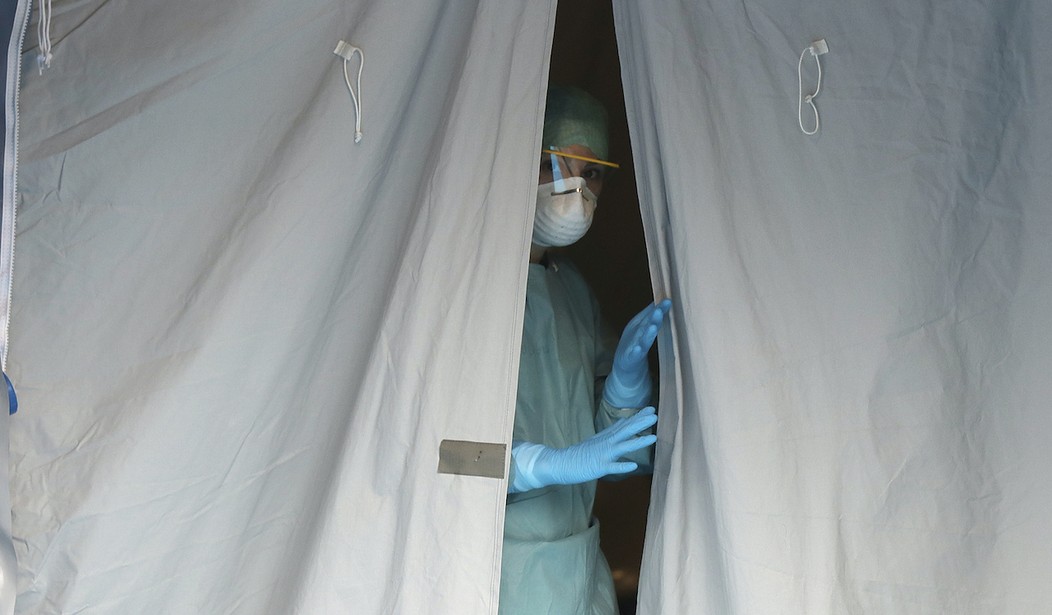We're in serious need of some positive news, and it looks like it may be arriving in the somewhat unlikely form of an update on the global coronavirus pandemic. As infection rates and hospitalizations fall across the United States, including in states that began reopening approximately a month ago, new findings from hard-hit Italy suggest that the disease itself may be growing significantly weaker and less lethal. We'll get to that in a moment, but first, here is the data behind the heartening US trends:
THREAD: Overall new Covid hospitalizations fell last week after increasing in prior week. On average 1,382 people were admitted for Covid each day last week in the 60% of states reporting data on new daily Covid admissions. 1/x pic.twitter.com/P630BPy5kA
— Scott Gottlieb, MD (@ScottGottliebMD) May 31, 2020
Gottlieb notes that in a handful of states, COVID hospital admissions have seen minor surges, but "in some other states where hospitalizations were rising, they have now largely flattened out." We shared information on improving infection rates late last week, which demonstrates that with testing capacity stronger than ever, the percentage of positive test results is falling. Now, there's this profoundly hopeful assessment from top Italian doctors, via Reuters:
The new coronavirus is losing its potency and has become much less lethal, a senior Italian doctor said on Sunday. “In reality, the virus clinically no longer exists in Italy,” said Alberto Zangrillo, the head of the San Raffaele Hospital in Milan in the northern region of Lombardy, which has borne the brunt of Italy’s coronavirus contagion. “The swabs that were performed over the last 10 days showed a viral load in quantitative terms that was absolutely infinitesimal compared to the ones carried out a month or two months ago,” he told RAI television...New infections and fatalities have fallen steadily in May and the country is unwinding some of the most rigid lockdown restrictions introduced anywhere on the continent. Zangrillo said some experts were too alarmist about the prospect of a second wave of infections and politicians needed to take into account the new reality...A second doctor from northern Italy told the national ANSA news agency that he was also seeing the coronavirus weaken. “The strength the virus had two months ago is not the same strength it has today,” said Matteo Bassetti, head of the infectious diseases clinic at the San Martino hospital in the city of Genoa. “It is clear that today the COVID-19 disease is different.”
Recommended
The story quotes Italian health officials pushing back, arguing that more evidence is needed before the public should feel confident that broad precautions have become less necessary or urgent. But if the virus' lethality is confirmed to be petering out, that would obviously be an exceptionally heartening development, and it could help explain why economic reopening steps haven't triggered a cascade of new cases or strains on the healthcare system here at home. There are causes for skepticism and caution, but many of the trendlines are undeniably better. Relatedly, a recent story from NPR describes data that increasingly suggests COVID's mortality is lower than once feared:
Mounting evidence suggests the coronavirus is more common and less deadly than it first appeared. The evidence comes from tests that detect antibodies to the coronavirus in a person's blood rather than the virus itself. The tests are finding large numbers of people in the U.S. who were infected but never became seriously ill. And when these mild infections are included in coronavirus statistics, the virus appears less dangerous. "The current best estimates for the infection fatality risk are between 0.5% and 1%," says Caitlin Rivers, an epidemiologist at the Johns Hopkins Center for Health Security. That's in contrast with death rates of 5% or more based on calculations that included only people who got sick enough to be diagnosed with tests that detect the presence of virus in a person's body. And the revised estimates support an early prediction by Dr. Anthony Fauci, director of the National Institute of Allergy and Infectious Diseases and a leading member of the White House coronavirus task force. In an editorial published in late March in The New England Journal of Medicine, Fauci and colleagues wrote that the case fatality rate for COVID-19 "may be considerably less than 1%."
If more testing is showing a significantly diminished death rate, and the virus's strength is waning, perhaps concerns over a major second wave of infections and deaths in the fall are premature -- to say nothing of notable progress on vaccines and other treatments. Meanwhile, on a subject we touched upon last Friday, the Wall Street Journal reports that a growing body of evidence indicates that reopening schools would be a safe public health decision:
A number of countries that have reopened schools in the past two months have reported no resulting increase in coronavirus infection rates, an encouraging sign for authorities around the world that are contemplating how and when to safely bring children back to the classroom. Authorities in many hard-hit countries such as Italy and the U.S. have so far resisted reopening schools for fear of triggering an increase in infections. In the U.S., schools have been drawing up plans to reopen in September, partly based on the experience of other countries. Researchers and European authorities said the absence of any notable clusters of infection in reopened elementary schools so far suggested that children aren’t significant spreaders of the new coronavirus in society...Denmark, Austria, Norway, Finland, Singapore, Australia, New Zealand and most other countries that have reopened classrooms haven’t had outbreaks in schools or day-care centers.
On the other hand, this cautionary tale out of Israel could complicate matters:
~2 weeks ago, Israel opened its schools fully. In the past 2 days, a superspreader event has occurred in a Jerusalem high school, w/ 103 new caseshttps://t.co/LZy84OgJdp
— Eric Topol (@EricTopol) May 31, 2020
This appears to be the largest school venue superspreader event to date https://t.co/CxgTYY2xgt via @gmknght
One relevant factor could be the age of the students. Daycare and elementary school-aged kids seem to be more or less unaffected, whereas the Israel 'super spreader' outbreak occurred in a high school. I'll again note that US data suggests young people, from infants to college-aged students, are almost entirely immune from dying of Coronavirus. Even despite the concerning Israeli example, American officials will have lots of international data to study, digest and act upon ahead of the new school year.

























Join the conversation as a VIP Member